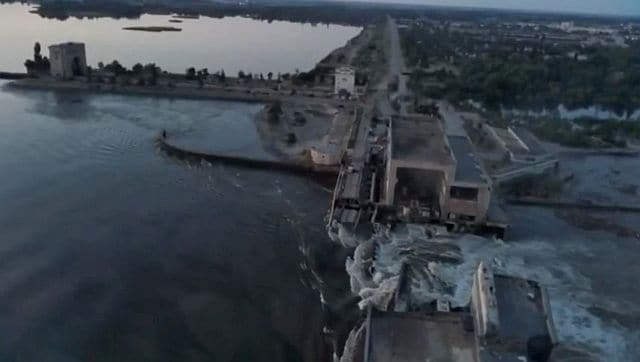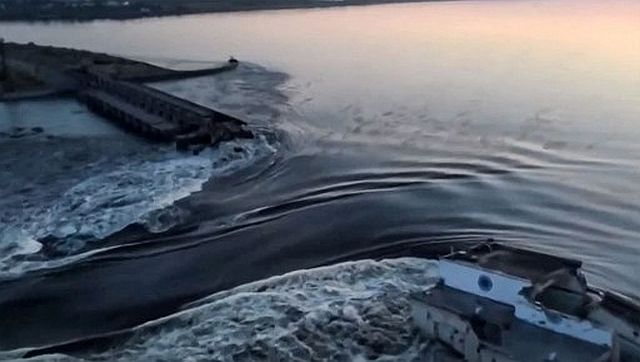The Nova Kakhovka dam in south Ukraine was split in two by explosions, causing water to cascade down the Dnipro River, flooding nearby homes and wildlife, and polluting drinking water sources. Some analysts believe the Russians bombed the dam in part to remind the world of the devastation it could do if its force is routed. Russian forces have already bombed residential buildings, schools and theatres, and looted and committed torture. According to prosecutors at the International Criminal Court, Vladimir Putin is also responsible for the mass abduction of Ukrainian children – a war crime. So, has another war crime been committed in the attack on the Kakhovka dam? Let’s take a closer look. Attack on Nova Kakhovka dam The Geneva Conventions and its protocols explicitly ban
war-time attacks on “installations containing dangerous forces” such as dams due to the risk posed to civilians, a prohibition likely to come into focus after the destruction of a huge Ukrainian dam. Ukraine accused Russia on Tuesday of blowing up the
Nova Kakhovka dam on the Dnipro River that separates Russian and Ukrainian forces in southern Ukraine, inundating a populated region of the war zone and forcing villagers to flee. [caption id=“attachment_12701742” align=“alignnone” width=“640”] The Geneva Conventions and its protocols explicitly ban war-time attacks on “installations containing dangerous forces” such as dams due to the risk posed to civilians. AFP[/caption] Kremlin spokesman Dmitry Peskov said Ukraine sabotaged the dam to distract attention from its faltering counteroffensive. The Ukrainian prosecutor general’s office said on Tuesday it was investigating the blast at the Nova Kakhovka dam, situated in Russian-occupied territory, as a war crime and possible act of environmental destruction, or “ecocide”. Russia had conducted a winter campaign of air strikes on Ukrainian energy and utilities infrastructure, damaging up to 50 per cent of the energy infrastructure. Kyiv said this was a war crime, while Moscow said the targets were legitimate. Attack on a dam: What kind of crime could it be? The 1949 Geneva Convention’s subsequent protocols specifically cover attacks on “installations containing dangerous forces”, such as hydroelectric dams. Such installations should not be attacked even if they are legitimate military objectives, “if such attack may cause the release of dangerous forces and consequent severe losses among the civilian population”, the protocols, dating from 1977 say. There is no mention of dams in the 1998 founding statute of the International Criminal Court. But the statute does criminalise “intentionally launching an attack in the knowledge that such attack will cause incidental loss of life or injury to civilians or damage to civilian objects or widespread, long-term and severe damage to the natural environment which would be clearly excessive in relation to the concrete and direct overall military advantage anticipated”. In a blog for the European Journal of International law on Tuesday, international law professor Marko Milanovic of the University of Reading said the dam’s destruction could amount to a war crime, or the graver offence of a crime against humanity, if it was carried out by Russia — “knowing of the harm that can befall the civilian population”. What does international law say? The Geneva Conventions and additional protocols shaped by international courts say that parties involved in a military conflict must distinguish between “civilian objects and military objectives”, and that attacks on civilian objects are forbidden. This prohibition is also codified in the Rome Statute of the ICC, which opened an investigation into possible war crimes in Ukraine soon after Russia’s February 2022 invasion, and has been examining attacks on infrastructure. [caption id=“attachment_12701752” align=“alignnone” width=“640”]
 Power infrastructure has long been considered a valid military objective as long as it supports an enemy army’s activities. Reuters[/caption] The prohibition seems clear-cut though some infrastructure owned and used by civilians can also be a military objective. Military objectives are defined as “those objects which by their nature, location, purpose or use make an effective contribution to military action”, and whose destruction or capture “offers a definite military advantage”. Is energy infrastructure military or civilian? Power infrastructure has long been considered a valid military objective as long as it supports an enemy army’s activities, even if the system also supports the civilian population, writes military law expert Michael Schmitt in the Articles of War blog run by the Lieber Institute for Law & Warfare at the United States Military Academy West Point. Milanovic said a dam “is not a military objective by its nature, but it may be such by its purpose or use”. In his blog he added: “The real question here is whether the dam was making ‘an effective contribution to military action’.” How are military needs balanced against civilian? But even if some targets could be considered military objectives, that is not the end of the story, says Katharine Fortin, associate professor of international law at Utrecht University. The military must consider whether the damage and loss incurred by civilians in such attacks are excessive compared to the concrete and direct military advantage, she said. Milanovic makes a similar argument. He says that even if a dam could be seen as a military objective, an attack could be legally classified as disproportionate — for instance, if the incidental loss of civilian life or damage to civilian objects is excessive when examining the direct military advantage expected. With inputs from Reuters Read all the Latest News , Trending News , Cricket News , Bollywood News , India News and Entertainment News here. Follow us on
Facebook,
Twitter and
Instagram.
Power infrastructure has long been considered a valid military objective as long as it supports an enemy army’s activities. Reuters[/caption] The prohibition seems clear-cut though some infrastructure owned and used by civilians can also be a military objective. Military objectives are defined as “those objects which by their nature, location, purpose or use make an effective contribution to military action”, and whose destruction or capture “offers a definite military advantage”. Is energy infrastructure military or civilian? Power infrastructure has long been considered a valid military objective as long as it supports an enemy army’s activities, even if the system also supports the civilian population, writes military law expert Michael Schmitt in the Articles of War blog run by the Lieber Institute for Law & Warfare at the United States Military Academy West Point. Milanovic said a dam “is not a military objective by its nature, but it may be such by its purpose or use”. In his blog he added: “The real question here is whether the dam was making ‘an effective contribution to military action’.” How are military needs balanced against civilian? But even if some targets could be considered military objectives, that is not the end of the story, says Katharine Fortin, associate professor of international law at Utrecht University. The military must consider whether the damage and loss incurred by civilians in such attacks are excessive compared to the concrete and direct military advantage, she said. Milanovic makes a similar argument. He says that even if a dam could be seen as a military objective, an attack could be legally classified as disproportionate — for instance, if the incidental loss of civilian life or damage to civilian objects is excessive when examining the direct military advantage expected. With inputs from Reuters Read all the Latest News , Trending News , Cricket News , Bollywood News , India News and Entertainment News here. Follow us on
Facebook,
Twitter and
Instagram.
Ukraine accused Russia on Tuesday of blowing up the Nova Kakhovka dam on the Dnipro River in southern Ukraine, inundating a populated region of the war zone and forcing villagers to flee. But can it be called a war crime?
Advertisement
End of Article


)

)
)
)
)
)
)
)
)



